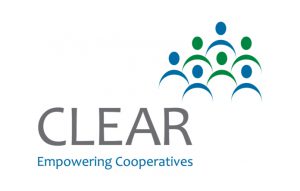Cooperatives Leadership, Engagement, Advocacy & Research (CLEAR)
- Improving cooperative business-enabling environments through regulatory reform and access to services and resources;
- Improving cooperative business performance through tailored capacity building; and
- Testing and analyzing positive behaviours among cooperative members that emerge as a result of participating in cooperatives and disseminating results among stakeholders.
CLEAR will continue to work closely with youth and women to empower them to create their own businesses and step into the formal economy by sharing risk and seizing new opportunities. Overview: USAID’s Cooperatives Leadership Engagement Advocacy and Research (CLEAR)
Global Communities implements a five-year program dubbed Cooperatives Leadership Engagement Advocacy and Research (CLEAR) funded by the USAID Bureau of Economic Growth, Education and Environment to stimulate an inclusive broad-based economic growth through support of the cooperative sector. CLEAR is designed to streamline and enhance the growth and development of the cooperatives movement in Kenya in line with the US strategy for Sub-Saharan Africa and in particular USAID/Kenya Country Development Cooperation Strategy 2014-2018.
CLEAR’s key focus is on promoting youth and women, socio-economic empowerment through the cooperative business model by tapping into existing opportunities in the service industry. CLEAR will work closely with key sector players in Kenya including the State Department of Cooperatives, the Cooperative Alliance of Kenya (CAK), the Cooperative University of Kenya, US International University Africa (USIU-A), Council of Governors (COG) and other partners to create an enabling environment for cooperatives to thrive.
Context of Kenya’s Cooperative Movement:
Kenya’s cooperative movement cuts across all sectors of the Kenyan economy, both formal and informal. The benefits that have accrued to Kenyans through cooperative enterprises include employment and wealth creation. Other than being engaged in the traditional areas of agricultural production, processing and marketing, the strength of co-operatives can now be felt in finance, real estate, manufacturing and mining.
The Movement has a membership pool of about 14 million cooperators and is considered the leading in Africa and occupies the seventh position globally. Cooperatives have improved individual livelihoods and contributed immensely to the national economic growth and play a major role in terms of domestic savings accounting for an estimated 20- 30% of total domestic savings.



